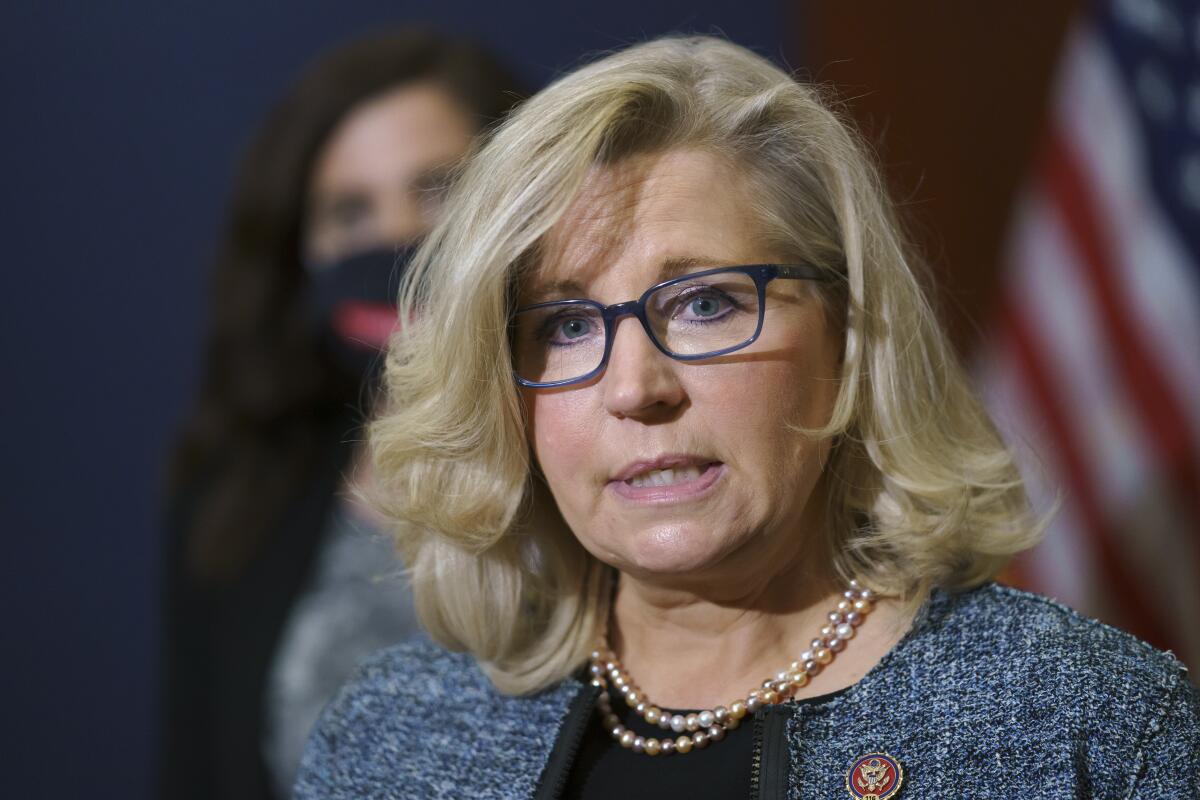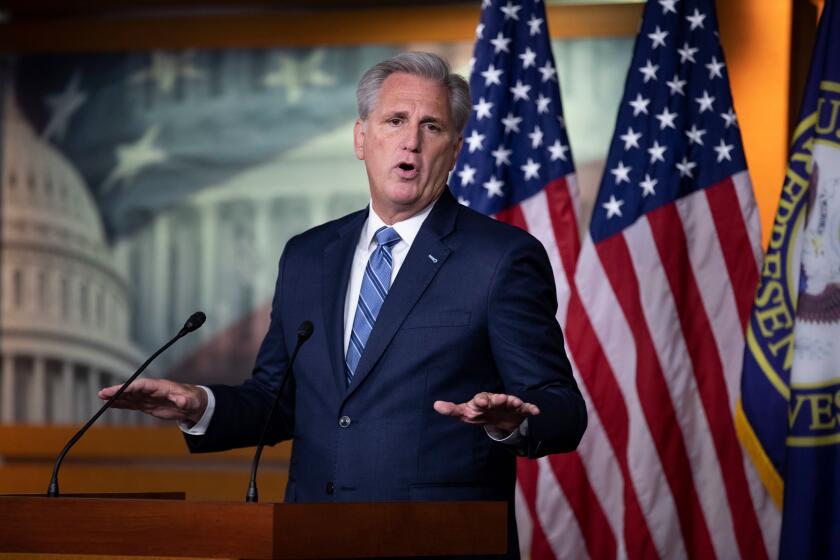House Republicans oust Rep. Liz Cheney from leadership post

- Share via
WASHINGTON — Three months ago, House Minority Leader Kevin McCarthy helped quell a small protest against Rep. Liz Cheney, one of the Republican Party’s most vocal critics of former President Trump, declaring the GOP a “big tent” that was broad enough to include dissenting voices.
But that tent deflated Wednesday morning, when House Republicans led by McCarthy (R-Bakersfield) voted to remove the Wyoming lawmaker as the party’s No. 3 leader in the House.
Shortly after Cheney opened the meeting of the House Republican Conference with a prayer, a motion was introduced to remove her from the job, as expected. The motion was approved by a voice vote so quickly that some Republicans missed it because they were running late.
There were voices in support of her, but reading the room, those supporters realized it wasn’t worth demanding a vote by secret ballot, said Rep. Ken Buck (R-Colo.), a member of the conservative House Freedom Caucus who supported Cheney.
“Even the people who voted ‘no’ felt it was unnecessary,” Buck said of a secret ballot. “It wasn’t going to change the outcome.”
Cheney was prepared for the outcome on Wednesday morning, defiantly standing by her message criticizing Trump’s falsehoods about election fraud and his role in the Jan. 6 Capitol insurrection.
“I will do everything I can to ensure that the former president never again gets anywhere near the Oval Office,” she said after the meeting.
Cheney’s removal makes it clear that House Republicans view their future as tied to Trump. But it doesn’t put to rest the ongoing tension in the larger Republican Party between a future tethered to the former president and one that moves the GOP forward as the opposition party under the Democratic Biden administration.
After months of trying to coexist with Cheney while leading a party largely aligned with Trump, McCarthy recently began helping to build the case for her removal.
“We represent Americans of all backgrounds and continue to grow our movement by the day. And unlike the left, we embrace free thought and debate,” McCarthy wrote in a letter to House Republicans on Monday.
“But our leadership team cannot afford to be distracted from the important work we were elected to do and the shared goals we hope to achieve,” he continued. “The stakes are too high to come up short.”
McCarthy quickly moved to build support for replacing Cheney with New York’s Rep. Elise Stefanik, a rising star in the party and an outspoken backer of Trump, whose endorsement she quickly received. But some conservatives are crying foul, accusing the leadership of moving too quickly to coronate a lawmaker who, despite her support for Trump, has a relatively moderate voting record — in contrast to Cheney’s consistently conservative record.
The removal of Cheney and the possible election of Stefanik — which is uncertain even though she has no declared opponents — represent a hardening of the McCarthy leadership team’s public alignment with Trump, and a sharpening contrast with Cheney‘s disavowal of his behavior since his election loss.
Some in the GOP believe McCarthy had no choice but to support Cheney’s removal, given the influence Trump has on so many House Republicans. In order to keep his job as minority leader and be in line for a promotion to House speaker when Republicans are next in control, McCarthy needs to keep those members happy, explained one Republican, discussing intraparty dynamics on condition of anonymity.
“I think that Kevin was boxed [in], frankly, and I think he did this reluctantly,” said Buck. “Kevin is very aware of the feelings of the base, and I feel like the base of our party has listened to President Trump and there is a lot of feedback to leaders from the base that they don’t like what Liz is doing.”
Cheney has consistently countered Trump’s false statements that the election was stolen and that President Biden was not rightfully elected. Trump’s role in encouraging the Jan. 6 insurrection in an attempt to overturn his loss is grounds for the party to permanently break with him ahead of the 2022 and 2024 elections, she says.
But Cheney’s opponents within the House Republican Conference say her insistence on challenging Trump’s election falsehoods is stoking party divisions and damaging the GOP’s efforts to combat Biden’s agenda.
“Na na na na, na na na na, hey hey, goodbye Liz Cheney,” Rep. Madison Cawthorn (R-N.C.) tweeted after the meeting.
Cheney’s departure marks the most substantial removal of a Trump opponent from the GOP ranks, as well as the deepening of a fissure among Republicans. And her removal underscores the power of the allegiance that House Republicans — unlike their Senate counterparts — still show Trump.
He’s closer than ever to his dream of being House speaker. But he’s compromised himself along the way.
In February, Cheney survived a threat to her leadership position. With the support of McCarthy and other GOP leaders, she was able to hang on to her post. Since then, as Cheney continued to speak out against Trump’s falsehoods about a rigged election, the quiet whispers to oust her grew.
Trump’s support among House Republicans, strong even in February, has only grown since then. Many rank-and-file members believe they have little chance of retaking the House majority in next year’s election without the former president’s support — or at least not with his active opposition.
“You can’t erase Donald Trump or his voters from the GOP and expect to win back the majority in the midterms,” tweeted Indiana’s Rep. Jim Banks, a McCarthy ally and chairman of the conservative Republican Study Committee.
But other Republicans disagree that Trump will hold sway in the 2022 midterm election, when he will not be on the ballot.
“Expelling Liz Cheney from leadership won’t gain the GOP one additional voter, but it will cost us quite a few,” tweeted Sen. Mitt Romney (R-Utah), also a critic of the former president.
And other Republicans question whether the House should demote a member for opposing Trump.
“Cancel culture is cancel culture, no matter how you look at it,” said Sen. Joni Ernst (R-Iowa). “I support President Trump and his policies, so I have a slightly different view [from Cheney] on that, but I still think we shouldn’t be trying to cancel voices.”
Illinois’ Rep. Adam Kinzinger, a strong Cheney supporter who has been equally vocal in denouncing Trump’s role in the insurrection, said before Wednesday’s vote that his fellow Republicans were about to remove Cheney from their leadership because her position as a truth-teller forced them to defend their position that the election was stolen.
“Cheney is making it uncomfortable for them,” Kinzinger said at a National Press Club event this week.
“When she’s asked about it, she doesn’t dance around. She just says the election wasn’t stolen, Biden is president ... and Jan. 6 was a Trump-inspired insurrection,” he explained. “And so that now gins up your local media again — you’re going to have to answer that. And she’s made it uncomfortable.”
House Minority Leader Kevin McCarthy has indicated there isn’t room in GOP leadership anymore for Rep. Liz Cheney. What the feud means for the party.
Cheney was not twisting arms in an attempt to preserve her job, recognizing that most lawmakers had already made up their minds about her position, according to other members. She has pledged to run for reelection, even as Trump is eyeing which of her several Republican challengers to back in an effort to oust her in Wyoming’s primaries.
Cheney’s role in the House Republican Conference — chairwoman — was a somewhat vague job title that reflected her position as the third-most-senior Republican. Her official duties were crafting the House GOP message and, unofficially, hosting a weekly meeting.
The position will be filled in a new election as soon as Friday.
Stefanik says if she is elected, she will focus on keeping Republicans on the same page as “one team.”
“My vision is to run with support from [Trump] and his coalition of voters, which was the highest number of votes ever won by a Republican nominee in 2020. We’ve expanded the party,” she said recently on Stephen K. Bannon’s “War Room” podcast.
“I’m committed to being a voice and sending a clear message that we are one team,” she continued. “And that means working with the [former] president and working with all of our excellent Republican members of Congress.”
If opposition to Stefanik’s speedy selection grows, the election could be delayed. But no one has emerged to challenge her, and Republicans are cognizant of keeping a woman in the job, as Cheney’s ouster means there are no women in House Republican leadership.
Stefanik’s critics are sharply opposed to a quick election.
Rep. Chip Roy of Texas wrote in a letter to fellow House Republicans that they should “contemplate the message Republican leadership is about to send by rushing to coronate a spokesperson whose voting record embodies much of what led to the 2018 ass-kicking we received by Democrats.”
Roy listed what he viewed as problematic votes in Stefanik’s record, including opposition to the Republican tax bill in 2017 as well as support for remaining in the Paris climate agreement and for the Democrats’ bill to condemn Trump over a lawsuit against the Affordable Care Act.
More to Read
Get the L.A. Times Politics newsletter
Deeply reported insights into legislation, politics and policy from Sacramento, Washington and beyond. In your inbox twice per week.
You may occasionally receive promotional content from the Los Angeles Times.













